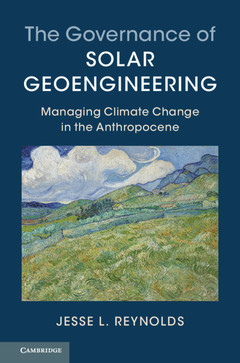Description
The Governance of Solar Geoengineering
Managing Climate Change in the Anthropocene
Author: Reynolds Jesse L.
Solar geoengineering could reduce climate change, but poses risks. This volume explores how it is, could, and should be governed.
Language: English
Subject for The Governance of Solar Geoengineering:
Approximative price 75.15 €
In Print (Delivery period: 14 days).
Add to cart
The Governance of Solar Geoengineering
Publication date: 05-2019
250 p. · 15.4x23 cm · Hardback
Publication date: 05-2019
250 p. · 15.4x23 cm · Hardback
Approximative price 39.35 €
In Print (Delivery period: 14 days).
Add to cart
The Governance of Solar Geoengineering
Publication date: 05-2019
250 p. · 22.9x15.2 cm · Paperback
Publication date: 05-2019
250 p. · 22.9x15.2 cm · Paperback
Description
/li>Contents
/li>Biography
/li>
Climate change is among the world's most important problems, and solutions based on emission cuts or adapting to new climates remain elusive. One set of proposals receiving increasing attention among scientists and policymakers is 'solar geoengineering', (also known as solar radiation modification) which would reflect a small portion of incoming sunlight to reduce climate change. Evidence indicates that this could be effective, inexpensive, and technically feasible, but it poses environmental risks and social challenges. Governance will thus be crucial. In The Governance of Solar Geoengineering, Jesse L. Reynolds draws on law, political science, and economics to show how solar geoengineering is, could, and should be governed. The book considers states' incentives and behavior, international and national law, intellectual property, compensation for possible harm, and non-state governance. It also recommends how solar geoengineering could be responsibly researched, developed, and - if appropriate - used in ways that would improve human well-being and ensure sustainability.
1. Introduction; 2. Climate change and solar geoengineering; 3. Solar geoengineering and emissions abatement; 4. International relations; 5. International law: legal norms, principles, custom, and organizations; 6. International law: the climate and atmosphere; 7. International law: human rights; 8. International law: other agreements; 9. US law; 10. Nonstate governance; 11. Nonstate actors and intellectual property; 12. International compensation and liability; 13. A path forward; 14. Conclusion.
Jesse L. Reynolds is an Emmett/Frankel Fellow in Environmental Law and Policy at the University of California, Los Angeles School of Law, as well as an associate researcher at Universiteit Utrecht and a research affiliate at Harvard University, Massachusetts. He has degrees from Tilburg University; the University of California, Berkeley; and Hampshire College, and has been a US Environmental Protection Agency Science to Achieve Results Graduate Fellow and a Fulbright Scholar.
© 2024 LAVOISIER S.A.S.




